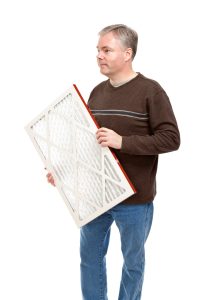If we could give only one piece of advice to our customers about their air conditioning systems, it would be this: remember to regularly change the AC’s air filter, averaging every 1 to 3 months.
Obviously, we can give plenty of other advice about ACs, with always scheduling maintenance each spring as next on the list. But we’re going to focus on the air filter (also known as the blower filter) in this post, because staying on top of filter changes makes an enormous difference for your air conditioning in Sandersville, GA. We’ll explain why, below.
The AC filter isn’t there to clean your air
Something that we want to make clear upfront is that the blower filter isn’t a device used to improve the indoor air quality in your home. One reason that people often ignore regular filter changes is because they think it’s a minor component for less dusty air. This is not the case: the blower filter is designed to protect the interior of the HVAC cabinet from dust and dirt infiltration that can come through the return air ducts.
What can occur if a dirty filter is left in place
A dirty air filter in your AC can lead to several issues:
Reduced airflow
A clogged filter restricts the amount of air that can pass through. This means your AC has to work harder to push air through your home, leading to decreased efficiency and increased energy bills. You might notice that some rooms aren’t cooling as effectively as they used to.
Increased wear and tear
When your AC system is working harder due to a clogged filter, it experiences more wear and tear. This can lead to more frequent repairs and a shorter lifespan for your unit. Components like the blower motor and compressor are particularly vulnerable to this increased strain.
Frozen evaporator coils
Reduced airflow can cause the evaporator coils to get too cold and eventually freeze. When this happens, your AC won’t be able to cool your home effectively, and you’ll need a professional to thaw the coils and fix the underlying issue.
Poor indoor air quality
While the primary purpose of the blower filter isn’t to clean your air, a dirty filter can still negatively affect indoor air quality. Dust and debris can bypass the clogged filter and enter your HVAC system, circulating throughout your home. This can exacerbate allergies and respiratory issues in your family.
Higher energy bills
As your AC struggles to maintain proper airflow, it consumes more energy to achieve the desired temperature. This inefficiency is reflected in your monthly utility bills. By simply replacing the filter regularly, you can maintain optimal energy efficiency and save money.
Keep Up With Regular Replacements
To avoid these issues, it’s crucial to change your AC filter regularly. Mark your calendar or set a reminder on your phone to check and change the filter every 1 to 3 months. This can vary depending on factors like the number of pets in your home, the presence of smokers, and the overall air quality in your area.
Even if you have a schedule, it’s a good idea to visually inspect your filter monthly. If it looks dirty or clogged, replace it immediately, regardless of your regular schedule.


